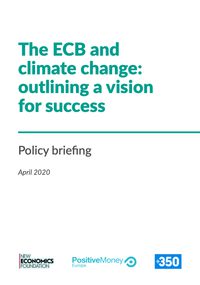The European Central Bank and climate change
Five steps towards a sustainable recovery.
28 April 2020
Published by NEF, Positive Money Europe and 350.org
The world is in the grip of an acute health crisis. Stopping the spread of the COVID-19 virus is impossible without also bringing the economy to a halt, pushing small, medium and large-scale firms over the edge, and risking many millions of jobs and livelihoods. The longer the economy is on pause, the deeper the recession and the more profound the challenge of recovery once the medical emergency abates.
In this context, governments and public institutions are rightly taking extraordinary steps to minimise the economic impacts of the crisis on individuals, businesses and society. The European Central Bank (ECB) has a pivotal role to play in this response, and has already implemented a number of ambitious measures.
However, the coronavirus crisis has hit us at a time of climate crisis too, and we cannot address one crisis while ignoring the other. It is essential that both short-term and long-term measures implemented by the ECB now are designed to both minimise the economic impacts of the coronavirus pandemic, and to achieve the EU’s climate commitments. Achieving these commitments demands a structural re-alignment of our financial sector with the challenges and risks posed by climate change.
Prior to the crisis, the governing council of the ECB had launched a review of its strategic and operational framework, which was due to explore how the ECB could contribute to the EU’s climate objectives. We recognise that the current crisis is having the effect of conducting parts of the review in real time, but we still hope that the review proper will recommence at the earliest possible opportunity. As debate about economic recovery begins, now is an opportune moment to consider how Europe’s most powerful economic institution can align its operations with the goals of the Paris Climate Agreement.
We welcome the statements by ECB President Lagarde stating that “climate change and environmental risks are mission-critical” to the ECB and should be “at the core” of any institution’s mission. It is our view that incremental adjustments to finance are not enough to tackle the monumental challenge of a rapid, sustainable and fair transition to a clean economy. The EU economy urgently requires innovative and bold reforms that reshape finance, so that it can help sustain our planet and enable us to thrive.
As part of the strategic review, the ECB has committed to listen to and engage civil society with an open mind. In the same spirit of constructive engagement, we offer policy makers a list of recommendations that, if implemented by the ECB, would constitute a successful strategic review from a climate justice perspective.
The ECB must:
- Align its asset purchasing programmes and collateral frameworks with the Paris Climate Agreement, to support the low carbon transition.
- Align its refinancing operations to the banking sector with the Paris Agreement to encourage more sustainable bank lending and fill the green investment gap.
- Support asset markets for sustainable investment and coordinate operations with the European Investment Bank (or other equivalent European institutions) to ramp up green investment and lock-in a low carbon future.
- Implement prudential measures to increase the resilience of the European banking sector to climate risks and reduce brown financial flows (e.g. financing of fossil fuels).
- Lead by example on climate disclosures and transparency by assessing and regularly communicating to elected officials the alignment of its operations with the Paris Agreement and that of the European Banking sector.
Photo by Thomas Hassel (CC BY-NC-ND 2.0)
Topics Banking & finance Climate change







